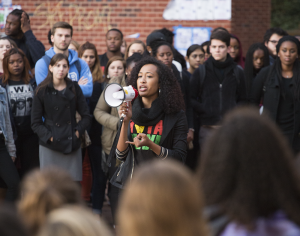
The GUSA senate passed a resolution in support of the activism of collegiate students of color, including those at Georgetown.
The Georgetown University Student Association senate passed a resolution 27-1 to stand in solidarity with victims of collegiate racism Sunday in light of recent events highlighting racial injustice on college campuses such as the University of Missouri.
The resolution, which was shared by GUSA yesterday in a student-wide email, expressed support for students of color who encounter institutional injustice on their college campuses and vowed to recognize the validity of student demonstrators’ demands and challenge university administrators to ensure the safety of students in all universities.
Speaker of the Senate Enushe Khan (MSB ’17), who introduced the resolution with At-Large Senator Jasmin Ouseph (SFS ’19), said it is important for GUSA to take a position on pressing current issues.
“This is essentially saying that as a campus here, as an undergraduate body here, we’re taking a stance on this,” Khan said. “If anything, we hope that this furthers dialogue on our campus in terms of our own history of racism and racial profiling.”
Last week, racial tensions at Mizzou, Yale and other universities resulted in ongoing protests, strikes and the resignations of university administrators.
Student activists at Georgetown also organized a demonstration in solidarity with victims of collegiate racism in Red Square last Thursday.
Village A Senator Ben Costanza (COL ’18), who voted against the resolution, said he took issue with the message behind the resolution and that he would support a resolution of solidarity if the protesters at other campuses changed their methods.
“There’s obviously a problem with racism in this country. There’s implicit racism and there’s direct racism, and that problem is obviously also evident on college campuses. However, what these students at Mizzou and Yale are doing is not helping that problem,” Costanza said. “What these students are doing is infringing on the rights of others, namely the right to free speech and the rights of the freedom of the press.”
Off-Campus Senator Owen Coffin (COL ’16) agreed that certain student protests promote division.
“I personally don’t think the conversation at Yale has been to the level of articulation of which we know those students are capable,” Coffin said. “We know that their concerns are valid and it is very emotional, and that’s probably what makes some of these debates so divisive is because there’s a lot of passion and there’s a lot of pain in them.”
Other senators scrutinized the language of the resolution before approving it.
Coffin took issue with the wording of the original resolution, specifically the fact that it mentioned schools such as the University of Missouri and Yale University. He said that he did not think it was appropriate for outside groups to have the power to make decisions about the language of senate resolutions.
“I understand that the language is very important and that some of the most effective and probably knowledgeable student leaders were of use in drafting it,” Coffin said. “But this is a GUSA senate piece of legislature, and you cannot let outside groups write our legislation for us merely because of outside pressure.”
Ouseph disagreed with Coffin, saying that GUSA senators wrote the resolution but valued the input and concerns of the students in that process.
“It wasn’t like other people were writing for us. We wrote it. We just wanted to make sure that what we were addressing is actually important to the people it primarily concerns,” Ouseph said. “GUSA is meant to represent the undergraduate body as a whole, and that includes students that may not necessarily be represented here.”
Alumni Square and Nevils Senator Roopa Mulpuri (SFS ’18) argued that retaining the names of specific colleges increased the weight of the resolution. She also mentioned that by issuing a resolution, GUSA would be acknowledging instances of injustice at Georgetown.
“I think part of the problem is not acknowledging the validity of specific instances of systematic injustice,” Mulpuri said. “I think part of the issue is acknowledging that it is happening at specific places. As for the resolution as a whole … we’re acknowledging that it is probably also happening at Georgetown.”
Khan said the resolution reflects the thoughts of the majority of the student body.
“Essentially, this is how a great part of our student body feels — that it is important to take a stance and to stand in solidarity with fellow students across the country,” Khan said. “This is just a matter of our student body saying that we stand in solidarity with college students elsewhere as well.”





















Anonymous • Nov 20, 2015 at 4:34 am
Any information on what the resolution actually says or does or are we supposed to just applaud it without question because of it’s title?